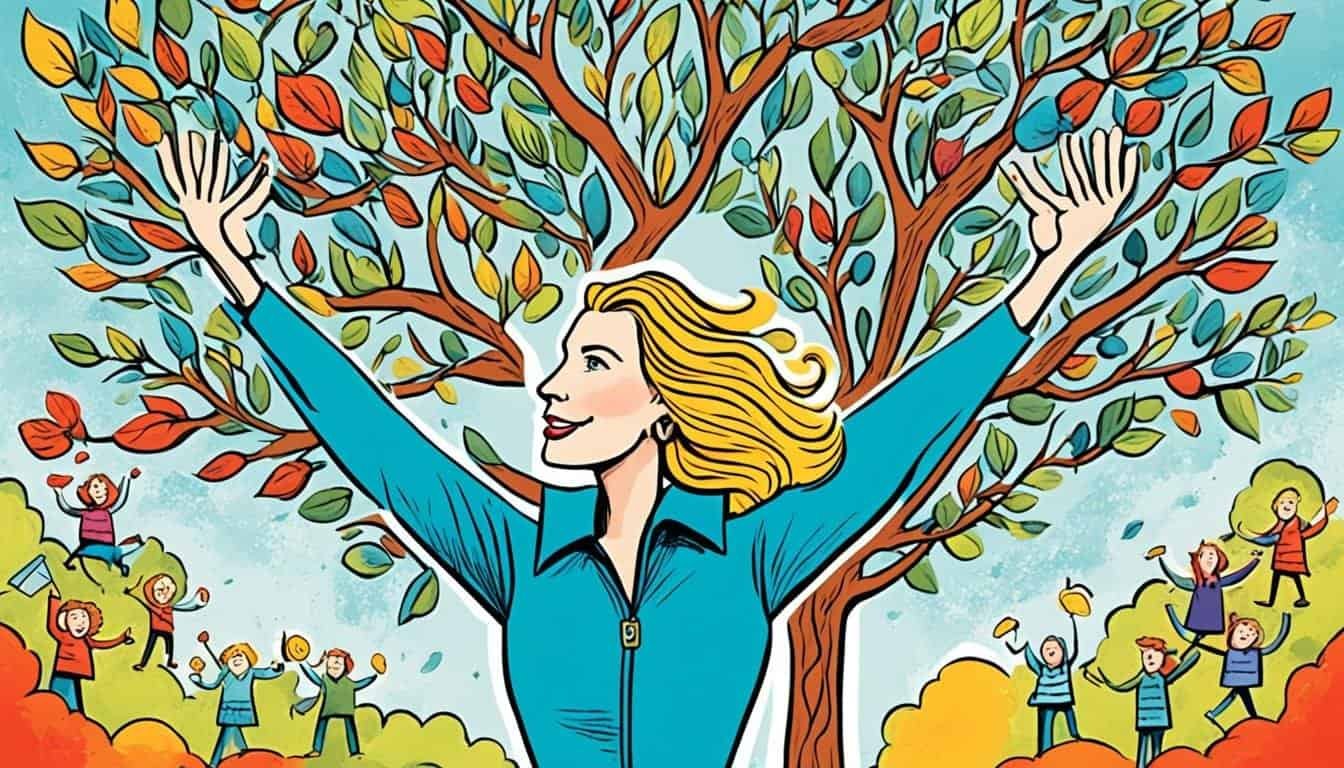Empowering Insights: Lessons from Julie Lythcott-Haims
“The greatest lessons in life, if we would but stoop and humble ourselves, we would learn not from the grown-up learned men, but from the so-called ignorant children.” – Mahatma Gandhi
Welcome to a thought-provoking journey of insight and empowerment. In this article, we explore the invaluable lessons shared by Julie Lythcott-Haims, an accomplished author and advocate for nurturing independence and resilience in young people.
Julie Lythcott-Haims is the author of the groundbreaking book “How to Raise an Adult: Break Free of the Overparenting Trap and Prepare Your Kid for Success.” With her new book, “Your Turn: How to Be an Adult,” she continues to inspire individuals with her wisdom and guidance on embracing adulthood and flourishing in a complex world.
As we dive into the key takeaways from Julie Lythcott-Haims, we explore the challenges of transitioning to adulthood, the dangers of overparenting, the importance of setting boundaries, and the art of embracing imperfection. Through her powerful insights, she empowers us all to shape a brighter future for ourselves and the younger generation.
Key Takeaways:
- Recognize the wisdom in children and learn from their unique perspective.
- Embrace the challenges of adulthood and cultivate resilience.
- Communicate effectively with clear expectations on freedom and responsibility.
- Take courageous action and embrace the beauty of imperfection.
- Understand the risks of overparenting and foster independence in young people.
What is “adulting” and the challenges of transition to adulthood.
According to Julie Lythcott-Haims, “adulting” is a term coined by the millennial generation to describe the phase of life between childhood and death. It refers to the period where individuals become responsible for planning, managing, and handling the challenges of life without being dependent on others to do it for them. The transition from adolescence to adulthood can be challenging for both parents and kids, as parents need to gradually relinquish control and prepare their children to be independent and self-sufficient. This leap can be seen as a chasm that teenagers have to cross, and it is important for parents to support and guide them during this transition.
Understanding the Phase of “Adulting”
“Adulting is that phase between childhood and death” – Julie Lythcott-Haims
The concept of “adulting” signifies a critical stage of life where individuals navigate the challenges and responsibilities of being independent adults. It is a time of self-discovery, personal growth, and learning to make decisions that shape one’s future. During this phase, young people transition from relying on their parents for guidance and support to taking charge of their own lives.
Independence and Freedom
The challenges of transitioning into adulthood revolve around establishing independence and embracing newfound freedom. Young adults must learn to manage everyday tasks such as finances, career choices, education, relationships, and personal well-being. It is a time of exploration, self-reliance, and discovering one’s own identity.
Parent-Child Challenges
Both parents and kids face unique challenges during this transition. Parents often struggle with the delicate balance of providing support and guidance while gradually stepping back to allow their children to take the reins. It can be challenging for them to accept that their children are becoming autonomous individuals with their own thoughts, ideas, and values.
On the other hand, young adults may find themselves overwhelmed by newfound responsibilities and decision-making. They may grapple with defining their own path, creating a sense of purpose, and establishing healthy boundaries with their parents.
In this phase, effective communication, understanding, and empathy are crucial for fostering a smooth transition. Parents and kids need to navigate this transformative period together, supporting one another and respecting each other’s perspectives.
Communicating and balancing freedom and responsibility.
Julie Lythcott-Haims emphasizes the importance of setting clear expectations and effectively communicating with teenagers to achieve a balance between freedom and responsibility. It is crucial for parents to convey the message that responsibility is not a negative burden but an integral part of adulthood.
By assigning certain responsibilities to their children, parents entrust them with the opportunity to develop their capabilities and become independent individuals. This act of trust empowers young people to take ownership of their actions and decisions.
“Being responsible is not a bad thing. It’s part of growing up and becoming an adult.” – Julie Lythcott-Haims
When communicating with teenagers, parents should strive to adopt a compassionate tone of voice. This tone should balance empathy and understanding while still maintaining a healthy psychological distance. This healthy distance allows teenagers to make their own choices and learn from their experiences, promoting their personal growth and resilience.
Setting clear expectations and communicating openly and honestly with teenagers creates an environment where they can thrive and flourish. It provides them with the guidance and support needed to navigate the challenges of adulthood while also fostering their independence and self-sufficiency.
The importance of clear expectations
Setting clear expectations is essential in helping teenagers understand the boundaries and responsibilities that come with their newfound freedom. It provides them with a framework within which they can explore their independence while still adhering to the values and principles imparted by their parents.
The role of tone of voice
The tone of voice parents use when communicating with teenagers significantly impacts how their messages are received. By adopting a compassionate and empathetic tone, parents can foster open and honest conversations, fostering a sense of trust and respect between themselves and their children.
Creating a healthy psychological distance
Cultivating a healthy psychological distance allows parents to create a supportive environment where teenagers can make their own decisions, solve problems, and learn from their experiences. This distance encourages independence and fosters the development of critical thinking and decision-making skills.
Taking action and embracing imperfection.
Julie Lythcott-Haims strongly advocates for individuals, especially young adults, to embrace action and imperfection. She draws inspiration from principles of design thinking and improv, recognizing the value of trying something new and stepping outside of one’s comfort zone. By doing so, individuals open themselves up to new experiences and opportunities for growth.
“The only way to learn is by doing, and the only way to get better is by making mistakes.”
Julie believes that it is important to have a bias toward action and start moving in a direction, even if one is unsure of the outcome. By taking action, individuals can gain valuable insights and learn from their experiences, ultimately becoming more resilient and adaptable.
Embracing imperfection is another key aspect emphasized by Julie. She acknowledges that perfection is unrealistic and that mistakes are an essential part of the learning process. Instead of fearing failure, Julie encourages individuals to see it as an opportunity for growth and development.
Trying something new and stepping outside of one’s comfort zone is not always easy, but it is necessary for personal and professional growth. By embracing imperfection and taking action, individuals can broaden their horizons, develop new skills, and gain a deeper understanding of themselves and the world around them.
Learning from Experiences
Learning from experiences is a fundamental aspect of personal growth and development. Julie Lythcott-Haims believes that every experience, whether positive or negative, has the potential to teach valuable lessons and shape one’s character.
When individuals have the courage to try something new and embrace imperfection, they open themselves up to a world of possibilities. They gain firsthand knowledge and insights that textbooks and theories cannot provide. Each experience becomes an opportunity for growth and learning.
“Experience is the teacher of all things.”
Julie encourages individuals to reflect on their experiences, analyzing what went well and what could have been done differently. By reflecting and learning from past experiences, individuals can continue to improve and refine their skills and decision-making abilities.
It is important to note that not all experiences will be positive or yield the desired outcome. However, even from the most challenging experiences, there is an opportunity to learn and grow. Embracing imperfection and learning from experiences allows individuals to develop resilience, adaptability, and a deeper understanding of themselves and the world around them.
| Benefits of Taking Action and Embracing Imperfection |
|---|
| Increase resilience and adaptability |
| Develop new skills and knowledge |
| Broaden horizons and gain new perspectives |
| Enhance problem-solving and decision-making abilities |
| Build confidence and self-esteem |
| Learn from failures and mistakes |
The dangers of overparenting and the impact on young people.
Julie Lythcott-Haims raises awareness about the dangers of overparenting and how it can have a negative impact on young people. Overparenting is when parents excessively control and manage every aspect of their child’s life, often leading to disempowerment and limited problem-solving skills.
By constantly handling every challenge and decision for their children, overparenting prevents them from learning how to independently navigate and overcome obstacles. This lack of independence and self-sufficiency can result in a diminished sense of resilience and confidence in their own abilities.
When young people are not given opportunities to solve problems on their own, they struggle to develop critical thinking and problem-solving skills, which are crucial for success in adulthood. This overdependence on parental guidance can hinder their growth and hinder their ability to face challenges with confidence.
“Overparenting can hinder a young person’s ability to develop resilience and problem-solving skills, leading to disempowerment and a lack of confidence in their own abilities.”
It is essential for parents to strike a balance between guidance and allowing their children the space to develop their independence. By giving young people the freedom to make their own choices and learn from their experiences, parents foster resilience and empower their children to become self-reliant individuals.
Encouraging young people to take risks, embrace imperfections, and learn from failures is crucial for their personal growth and development. By allowing them to face setbacks and challenges, parents enable them to build problem-solving skills, resilience, and confidence in their ability to overcome obstacles.
“By allowing young people to face challenges and learn from failures, parents empower them to develop problem-solving skills, resilience, and confidence.”
To illustrate the dangers of overparenting and its impact on young people, consider the following table:
| Dangers of Overparenting | Impact on Young People |
|---|---|
| Disempowerment | Young people become highly dependent on parental guidance and lack confidence in their own abilities. |
| Lack of Resilience | Without experiencing challenges and setbacks, young people struggle to develop resilience and adaptability. |
| Limited Problem-Solving Skills | Overparenting prevents young people from learning how to independently solve problems and make decisions. |
The table above demonstrates how overparenting can disempower young people, limit their resilience, and hinder the development of problem-solving skills. It is crucial for parents to recognize the importance of allowing their children to face and overcome challenges in order to foster independence and empower them for the future.
The importance of setting boundaries and limits.
When it comes to raising young people in the digital age, setting boundaries and limits is of utmost importance. Julie Lythcott-Haims, renowned author and parenting expert, emphasizes the need for parents to exercise their authority and establish rules around screen use. By doing so, they not only promote healthy screen habits but also foster independence and responsibility in their children.
As parents, it is essential to strike a balance between allowing our children to explore the digital world and ensuring they develop healthy habits. This means setting clear expectations and boundaries around screen time, such as limiting the number of hours spent on devices or designating specific screen-free zones and times. By doing this, we provide structure and guidance, teaching our children to manage their own time effectively.
Moreover, authority as parents is key in this process. It means taking an active role in monitoring and enforcing the boundaries we have set. Of course, this doesn’t imply being overbearing or controlling, but rather being present and engaged. By being consistent and following through with consequences when the boundaries are crossed, we teach our children the value of respecting limits.
Setting boundaries and limits doesn’t only protect our children from the potential dangers of excessive screen time, but it also helps them develop crucial life skills. By adhering to these boundaries, they learn self-discipline, time management, and the ability to prioritize tasks. These skills are essential for their future success and independence.
“Healthy screen habits contribute to fostering independence and self-control in our children. By guiding them in establishing boundaries, we are equipping them with the tools to navigate the digital world responsibly.”
The key to successful boundary-setting
While it is important to set boundaries, it is equally crucial to communicate effectively with our children. This means explaining the reasons behind the rules and allowing for open discussions. By engaging in honest conversations about the impact of excessive screen time and the benefits of balance, we help our children understand the rationale behind the boundaries we set.
It’s also essential to lead by example. As parents, we need to model healthy screen habits and demonstrate that we too can prioritize other aspects of life over endless screen time. By doing so, we show our children that setting boundaries applies to everyone, regardless of age.
Creating a technology agreement together as a family can also help establish clear boundaries and expectations. This agreement can outline the limits, consequences, and responsibilities associated with screen time, ensuring that everyone understands and agrees to the rules.
In the digital world, where screens are pervasive, it is our responsibility as parents to guide our children and help them develop a healthy relationship with technology. By setting boundaries and limits, we equip them with the tools to navigate the digital landscape responsibly, fostering independence and self-control.
| Benefits of Setting Boundaries and Limits | Role of Parents |
|---|---|
| Promotes healthy screen habits | Exercise authority and set rules |
| Fosters independence and responsibility | Communicate effectively and lead by example |
| Teaches self-discipline and time management | Create a technology agreement together |
Shifting from a rescue mentality to nurturing independence.
Julie Lythcott-Haims’s message to parents is clear: it’s time to shift from a rescue mentality to nurturing independence in our children. Instead of constantly swooping in to solve every problem, parents should provide unconditional love and empathy while allowing their children the space to make their own choices and learn from their experiences. By adopting this approach, parents become allies and guides, empowering their children to develop their own resilience and problem-solving skills.
According to Lythcott-Haims, fostering independence requires a balance of support and autonomy. It’s crucial for parents to strike a balance between providing guidance and allowing their children to discover their capabilities. By doing so, parents allow their children to develop a sense of ownership and responsibility. Through this nurturing environment, children can flourish and grow into independent individuals.
“Parents who shift their mindset from rescuer to nurturer become allies and guides, assisting their children in charting their own course.”
By shifting away from the rescue mentality, parents create an environment where their children feel safe to explore, take risks, and learn from their mistakes. This shift also encourages children to develop a healthy sense of autonomy, enabling them to navigate challenges on their own. Lythcott-Haims emphasizes that while parents can still provide guidance and support, it is important to foster a sense of responsibility and agency in their children.
Ultimately, the transition from a rescue mentality to nurturing independence requires parents to embrace ally behaviors. This means being there for their children, offering guidance and encouragement, while also allowing them the freedom to learn and grow. It involves providing a framework of support that empowers children to make their own choices and face their own challenges, all the while knowing that their parents are there as a safety net, ready to offer love and guidance.
As parents, we have the opportunity to shape the future by empowering our children to become independent, resilient individuals. It starts with shifting our mindset, embracing unconditional love, empathy, and ally behaviors. By nurturing independence, we can help our children develop the skills they need to thrive in an ever-changing world.
| Key Takeaways: |
|---|
| • Shifting from a rescue mentality to nurturing independence is vital for children’s development. |
| • Parents should provide unconditional love, empathy, and support. |
| • Allowing children to make their own choices and learn from experiences is essential. |
| • Becoming allies and guides helps children develop resilience and problem-solving skills. |
Ally behaviors and creating positive change.
In her insightful work, Julie Lythcott-Haims urges individuals to embrace ally behaviors and actively work towards creating positive change. By actively listening and learning from those with different experiences and backgrounds, advocating for equity and inclusivity, and challenging systemic biases and discrimination, we can contribute to a more inclusive and equitable society.
Embracing Diversity and Listening and Learning
One crucial aspect of allyship is embracing diversity. By recognizing and celebrating the richness of our differences, we create an environment that fosters inclusion and understanding. This means actively seeking out diverse perspectives, experiences, and voices, and listening to their stories. Through genuine curiosity and open-mindedness, we can learn from others and broaden our own understanding of the world.
“Allyship is about supporting and amplifying the voices and experiences of marginalized groups. It involves understanding our privilege and using it to challenge and dismantle inequitable systems.”
Advocacy and Creating Change
As allies, it is crucial that we use our voices and platforms to advocate for equity and inclusivity. This involves challenging discriminatory practices, speaking up against injustice, and actively working towards dismantling systemic barriers. By amplifying marginalized voices and advocating for change, we can contribute to a more just and equitable society for all.
Conclusion
In conclusion, Julie Lythcott-Haims offers valuable insights and lessons on parenting, transitioning to adulthood, and creating a more empowered and resilient future. Her work emphasizes the importance of fostering independence, setting boundaries, and embracing imperfections.
By nurturing independence, parents can guide their children toward becoming self-sufficient and confident individuals who are capable of facing life’s challenges. Effective communication and clear expectations help teenagers understand the balance between freedom and responsibility, preparing them for the transition to adulthood.
Furthermore, embracing imperfections and taking action are vital for personal growth. Julie encourages individuals, especially young adults, to step out of their comfort zones, try new things, and learn from their experiences. This builds resilience and helps them navigate the complexities of adult life.
Finally, embracing ally behaviors and advocating for diversity and inclusivity contributes to a more empowered and inclusive society. By listening, learning, and challenging biases and discrimination, individuals can create positive change and foster a sense of belonging for all.
Source Links
- https://medium.com/@jenniferbrown_97699/real-american-julie-lythcott-haims-on-identity-mental-health-and-the-next-gen-workforce-3920a98234ed
- https://www.gsb.stanford.edu/insights/speech-empowers-how-encourage-growth-resilience-younger-audience
- https://www.healthyscreenhabits.org/s7-episode-8-how-to-get-there-the-road-to-raising-an-awesome-adult-julie-lythcott-haims-jd-mfa








